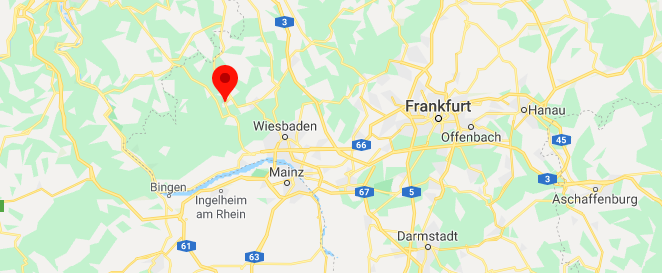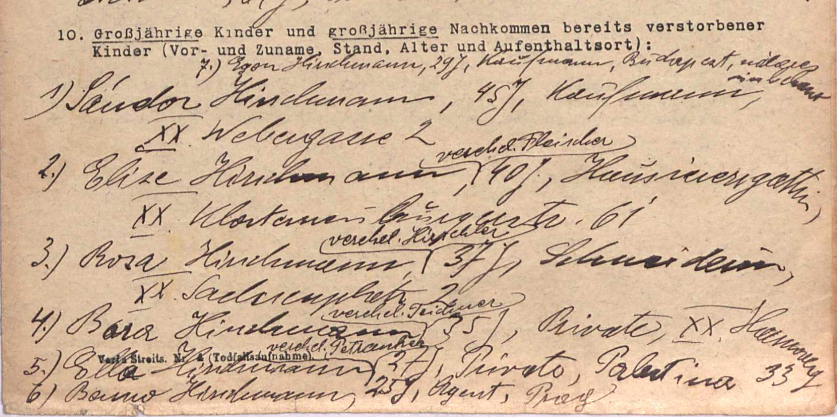Digging Deep in German Records: Jews in Hessian Church Books
Germany is one of the easiest countries for researching Jewish ancestors because the country's records have been so well-maintained. For Jews living in the largest cities of Germany (Berlin, Hamburg, Frankfurt, for example), civil records have been indexed and are largely available on sites including Ancestry.com.
Other parts of Germany, though, are not so straightforward. One example is the town where I have ancestors from, called Bad Schwalbach. Bad Schwalbach (formerly called Langenschwalbach) is the district seat of Rheingau-Taunus-Kreis in the state of Hessen and near the border with Rheinland-Pfalz.
 |
| Bad Schwalbach's location, near Wiesbaden, Mainz and Bingen |
Generally speaking, Jewish records from Hessen are quite easy to access. They include the following sources:
- Civil records beginning 1874/5 are available on Ancestry.com; those from Frankfurt date back even further, to the first half of the 19th century, in the horribly mislabeled collection "Rhineland, Prussia, Lutheran Baptisms, Marriages, and Burials, 1533-1950."
- Before civil registration, a large swath of towns in Hessen had a separate register for Jews, in which the Jews kept their own vital records. These records -- now commonly referred to as the Gatermann collection -- have been indexed and are available on JewishGen, the Hessen State Archives' website and FamilySearch (through searching the catalog).
When I looked through all of these sources, though, I noticed that Bad Schwalbach and towns nearby, such as Wiesbaden, did not appear in the Gatermann collections. What I learned is that the former Herzogtum Nassau -- the Duchy of Nassau, which existed in the first half of the 19th century -- registered Jews and Christians together, in a civil book. The confusing part, though, is that these records appear to have been maintained through the Evangelical (Protestant) Church.
 |
| Map of the former Herzogtum Nassau (in gray) |
Jewish records that appear in church books from this region are accessible on FamilySearch, but only through the catalog and (unfortunately) only at a Family History Center. The only ones that appear to have been indexed are those from Wiesbaden, available also in a horribly mislabeled collection named "Baden, Germany, Lutheran Baptisms, Marriages, and Burials, 1502-1985."
To find these records, you have to use the keyword search within the FamilySearch catalog and search for Kirchenbuchduplikat and then only review sources from the Evangelische Kirche (the Protestant Church). These records generally span approximately 1818 to 1875. The entry for Bad Schwalbach, for example, appears as follows in the catalog:
Reviewing these records takes time and effort because there is no transcribed index, and because the Jewish and Christian records are intermingled; so you must go page by page. Many times there will be a handwritten index on the film, which greatly aids in the searching, but from this region, Jews used patronymic names until 1841, meaning they will appear in indexes in those earlier years based on their father's given names and not their eventually-adopted surnames.
Below is an example of a death record pre-dating the adoption of surnames from Bad Schwalbach. This is the death entry of my 6th great-grandmother, Jached Zacharias, who married Salomon (Schlames) Bär.
 |
| Death entry for Jachent Salomon, Bad Schwalbach, April 10, 1819 |
This death entry is loaded with information, including the following:
- Entry 16, date of death April 10, 1819, during the 10th to the 11th morning, buried on April 11.
- Jachent / Schlammes / Salomon (Jachent wife of Schlammes, aka Salomon), no surname.
- Place of death: L[angen] Schwalbach.
- Time and place of birth, residence, status, profession and religion: Born the 10th of May 1765 in Runkel, widow of Salomon Bär of L[angen] Schwalbach, merchant, Jewish religion.
- Name of parents, status, profession and residence: Zacharias Abraham, cattle dealer in Runkel, and his likewise deceased wife Martha.
- Notes: Married in 1785 with Salomon of Schwalbach and leaves from their marriage two married daughters.
This is truly a genealogical blessing of an entry from as early as 1819. Not only do we get date and place of birth, but parents' names and locations, and even marriage date and living heirs.
Next is a marriage entry for other relatives of mine in the town of Breckenheim. Included below are the left and right pages of the marriage record (after a glance at the full page):
| Marriage of Salomon Abraham Cahn and Johanne Metzger, Breckenheim, March 2, 1835 |
This entry is likewise full of remarkable detail, as follows:
- Entry 4, date of marriage: March 2, 1835.
- Groom: Salomon Abraham, as of 1841 Salomon Cahn (i.e., following name adoptions)
- Birthdate and place: 25th of October 1805 in Breckenheim.
- Religion, status, profession and residence: Schutzjude [protected Jew] in Breckenheim, widowed as of the 9th of January 1834 upon the death of his first wife Hanchen.
- Parents' names, status, profession and residence: son of the Schutzjude Abraham Salomon and his wife Schönchen in Breckenheim.
- Bride: Johanne Metzger
- Birthdate and place: 2nd of August 1811 in Mainz.
- Religion, status, profession and residence: Jewish religion, living previously in Mainz and now Breckenheim, single.
- Parents' names, status, profession and residence: daughter of the Jew Leon Metzger and his wife Esther Cahn in Mainz.
- Name, residence and religion of the marrying clergyman: Rabbi Samuel Salomon, from and in Baden.
- Notes: as of 26th of July 1841, Salomon Abraham adopted the surname Cahn.
* * *
In short, if you have ancestors from certain parts of Hessen that might have been in the former Duchy of Nassau, and you are not seeing any other Jewish collections pre-dating civil registration in the 1870s, check if there is an Evangelische Kirche Kirchenbuchduplikat from the town in the FamilySearch catalog, and you may be met with a pleasant surprise!
Enjoyed this post? Sign up here to receive email updates for when new posts are available.





Comments
Post a Comment